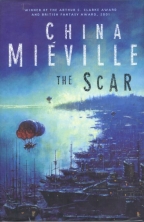The Scar
Macmillan / Pan Macmillan
UK Hardcover First
ISBN 0-333-78174-0
604 Pages; £17.99
Date Reviewed: 05-06-02
Reviewed by: Rick Kleffel
|

|
|
REFERENCES
|
COLUMNS
|
|
Fantasy,
Horror,
Science
Fiction
|
04-15-02,
05-06-02,
05-09-02,
05-16-02,
06-13-02,
12-13-02,
01-07-03,
01-27-03,
03-26-03,
09-13-03
|
For all the planning and conceptualization that go into building a
world in fantasy or science fiction literature, the bottom line is
that the building blocks are mere words. All the imagination in the
universe won't do a writer a whit of good if they can't find an
effective bit of language to work with. China Mieville has all the
imagination of his many predecessors, but most importantly, he has a
facility with language that enables him to spin a huge complex
picture with absolute veracity. Each block, each word falls into
place, perfect brush strokes to cover his huge canvasses. In 'Perdido
Street Station', Mieville managed a very impressive bit of world
building in the creation of New Crobuzon, a city that defies not only
nature, but also genre. His follow-up effort, 'The Scar' is every bit
as good as 'Perdido Street Station'. Set on Bas Lag, the same world
as 'Perdido Street Station', 'The Scar' starts out on the edge of New
Crobuzon and moves out to sea, never to return. Mieville launches
from his old creation but builds a whole new environment, just as
rich, just as complex as his ancient city. In itself, that would be
more than enough. But where he actually grows as a writer is in his
deployment of characters. The best moments of visual improvisation in
'The Scar' are matched by its quiet moments of character insight.
The novel starts as Bellis Coldwine, a translator, is on the run
from the old city. She books passage to Nova Esperium, a sort of
colony on the Terpsichoria, paying her way with her skills as a
translator. Alas, she does not know the language she is supposed to
translate, and is forced to learn it. "I made arrangements. I spent
my days in the company of one Marikkatch, an elderly he-cray who had
agreed to act as my tutor. Every day I would walk to the salt canals
of the cray quarter. I would sit on the low balcony that circled his
room, and he would settle his armoured underbody on some submerged
furnishing and twitch his scrawny human chest, haranguing me from the
water. ..It was heard. He did not read. He is not a trained
teacher....It might make a better story to claim that I had some
affection for him, that he is a lovable, cantankerous old gentleman,
but he is a shit and a bore...I left the embittered old bastard to
his stagnant water, quit my lodgings there and came to my
cabin..."
It would make a nice review to say that Bellis eventually becomes
a lovable, endearing character -- but she doesn't. She's difficult,
unfriendly and stubborn. Were it not for Mieville's sumptuous
language, she might make the book a more difficult read. Fortunately,
she's not the only main character. We're also treated to Shekel and
Tanner Sack. Shekel is a cabin boy on the ship, and Sack is a remade
being transported to work as a slave in Nova Esperium. Their
friendship and Shekel's growth make for some of the best
character-oriented reading this side of Jonathan Franzen.
As the journey in 'The Scar' unfolds, the reader will also be
treated to many, many incredible set-pieces, the reading equivalent
of particularly memorable movie scenes that will play in your brain
far longer and far stronger than any image you'll take in from the
big screen this summer or next or the one after that. Mieville does
not disappoint and doesn't hold back. Each time you think that you've
hit something that can't be topped, another bit comes along that tops
the one before it. Given that those 'untoppable' bits start cropping
up rather early in the novel, this is a very big accomplishment.
However, as with 'Perdido Street Station', one can experience a
certain invention-fatigue as Mieville pushes forth into his brave new
world. For some readers, this novel could seem like a meal consisting
only of rich, spicy entrees. In 'The Scar' those quiet character
moments really help to mitigate against this. It also helps that most
of the main characters are pretty much human. Pretty much.
Mieville's language is the glue here. His ability to come up with
atmospheric place names and effective, suggestive word twists (many
machines in this novel operate on chymical energy, for example)
brings his creation out of the la-dee-dah land of much fantasy and
into a more science fictional baseline. He backs this up with some
history of Bas-Lag, just a hint here and there, but as usual with
Mieville, a hint is all he needs. He's able to hand the reader just
the right pieces of the puzzle, to ensure that the picture that's
built up is bigger than the reader can quite contain, and bigger than
the novel itself. Mieville manages to make those 604 pages of words
add up to a world.
